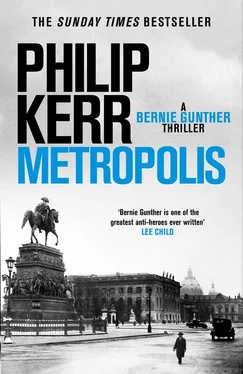The rest of the day and half of the night was spent interrogating him and eventually he confessed to both murders, with no sign of remorse. If I’d known that the court would later sentence him to just fifteen years in prison I almost might not have bothered, but of course clearing up a couple of murders was only part of the reason I’d gone after him. There’s nothing like solving a cold case to deflect attention from several hot ones.
For days no one mentioned Dr Gnadenschuss. Bernhard Weiss was able to call a press conference and make a big song and dance about the fact that Frieda Ahrendt’s case was more than a year old and to call for a little more patience when it came to reporting crime in the city. He even singled me out for praise, but this did little to allay my feelings of guilt at having covered up a greater crime.
Even Gennat offered me his congratulations although I could tell he was convinced that there was rather more to my tenacious detective work than met his eye. It was the elapse of time between my witnessing the murder of Willi Beckmann and the arrest of Hugo Gediehn that seemed to cause him the biggest problem.
‘You had the car registration number, a description of the killer and his Christian name — you almost had his shoe size — and yet you didn’t call it in,’ he said. ‘I don’t get that. Suppose Hugo Gediehn had taken off? He could have slipped across the Polish border and we’d have been none the wiser.’
‘It was a risk I was prepared to take.’
‘That wasn’t your decision to make. And that’s not how this Commission operates. You should know that by now. You could have telephoned me or someone else in this department and dictated the car’s registration number without breaking your cover.’
‘Look, when I saw Frieda’s name tattooed on Beckmann’s dead hand I wanted to see if I could make him a suspect for her murder. I couldn’t do any of that until I was through playing the klutz .’
‘But Willi Beckmann wasn’t going anywhere,’ objected Gennat. ‘He was dead. No, it looks very much as though you wanted to make yourself a hero. On the face of it, that would make you a glory seeker.’
‘Maybe you’re right. Maybe I am. Maybe I decided that we need a bit of glory around here.’
‘But only on the face of it. You’re not out for glory. Why say it when we both know it’s not true? That’s not who you are. I think I know you well enough to say that.’
‘I don’t know where you’re going with this, sir. The Murder Commission just put two unsolved murders to bed. What’s wrong with that?’
‘Nothing. Nothing at all.’
‘I was doing my job.’
‘Come on, Gunther. You’re playing an angle here. Only, I can’t see it. And that irritates me, because I’m supposed to be smart. They don’t call me the Big Buddha for nothing.’
‘I don’t know what you’re talking about, Ernst.’
‘Then I’ll spell it out for you. It’s the way this digs the Murder Commission out of a hole that I don’t like. It’s too convenient. All the bad press we were getting for not doing our jobs properly and now you come along and fix that overnight by solving two cases for the price of one. They’ll make you an inspector for this. Maybe give you a medal. Bernhard Weiss is ecstatic. So’s the minister.’
‘But you’re not.’
‘I’m a man with an ulcer. And when that’s not grumbling, I am. You’re a good detective, Gunther. One day you’ll be an excellent commissar. But you’re a man with secrets. That’s what I think. That there’s a lot more to you than meets the eye. I can’t help thinking that there’s a reason you solved these two murders when you did. And so very neatly it’s like they had pink bows on them.’
‘A reason?’
‘ A reason . I haven’t figured out what that might be. But I will. And when I do I can promise you we’ll have this conversation again. Until then, try to remember this: You can’t cut corners in our business. And you can’t make deals with the truth. That’s good advice, from one who knows. Otherwise, one day you’ll try to do the right thing and discover you’re so out of practice you can’t.’
It did not, of course, go unremarked that Kurt Reichenbach, a serving detective, was missing. But Police Praesidiums are busy places and it wasn’t long before the buzz about his absence subsided to little more than a murmur. There were some at the Alex who ascribed his sudden disappearance to a nefarious Prussian land deal gone wrong, that he’d been obliged to disappear before he could be arrested by his own department. One or two mentioned a rich mistress in Charlottenburg and were adamant that he’d run away with her; someone even claimed to have seen him taking the waters in Marienbad. Others suggested that he’d been murdered by the Polish intelligence services as a result of his supposed acquaintance with the Weimar foreign minister, Gustav Stresemann, who hoped to annex the so-called Polish Corridor and much of Upper Silesia. (It transpired that Reichenbach had occasionally acted as Stresemann’s bodyguard and, at the foreign minister’s request, had once met with agents of the Soviet OGPU, who were collaborating with Stresemann in opposing Polish statehood.)
But the majority of the men in Kripo, including Bernhard Weiss, were convinced he’d been murdered by right-wing nationalists simply because he was a Jew. It wasn’t just German politicians who were attacked because they were Jews, as Weiss himself knew only too well; several German bankers and businessmen had also been attacked, one of them fatally. What was more certain was that if Kurt Reichenbach hadn’t been a Jew, then perhaps some of his Kripo colleagues would have tried a bit harder to find him. Without a body or a witness, however, it was soon a case of out of sight, out of mind.
Even Traudl Reichenbach seemed reluctant to demand answers to her husband’s sudden disappearance, and eventually I wondered if she’d actually known more about the Winnetou murders than any of us could have suspected. I kept thinking of the Brennabor and the contents of the car’s boot: the hammer, the razor-sharp knife, the coat and the hat with the piece of wig attached. How innocent were those? Would anyone other than a homicide detective like me ever have connected those objects with a series of vicious murders? Surely there must have been one night when she had suspected her husband was guilty of something unusual: some blood on his shirt cuff perhaps; a trace of another woman’s perfume on his collar; a single stray hair. A wife just knows these things, doesn’t she? And what about those human scalps? What had Kurt done with the scalps? I don’t suppose I’ll ever know. But did she know? If anyone could handle that it was Traudl. Being a nurse, she was likely made of strong stuff, stronger stuff than most women, stronger stuff even than Brigitte Mölbling.
‘Robert has invited me to his home in England,’ Rosa told me. ‘To meet his mother and father.’
‘That sounds serious,’ I said.
‘Oh, it’s nothing like that.’
‘I wouldn’t be too sure. The minute you start speaking to parents you’ve got some innocent bystanders.’
‘No. It’s just that he wants me to meet them because they’re very old.’
‘So’s the Sabre of Charlemagne, but it’s not every girl I want to take to Vienna to see it.’
‘It isn’t how you think it is.’
But of course it was; it always is. Four weeks later I received a gold-embossed invitation to their wedding in Oxford and I never saw either of them again. Later on, Frau Weitendorf told me they were going to live in Cairo, that Rankin had been offered a job teaching English at the university. I was glad for them both, of course, especially Rosa, not least because I still had Brigitte in my life; at least I thought I did.
Читать дальше












